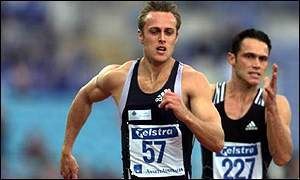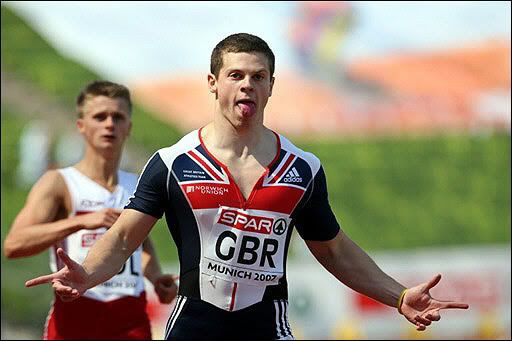Big interview
------------------------------------------------------------ --------------------
A white knight with the talent to cut a dash at London 2012
The Milton Keynes sprinter who goes for indoor gold this weekend has his sights on that Olympic miracle
Donald McRae
Tuesday February 27, 2007
The Guardian
"I'm shocked that people are actually calling me the saviour of UK athletics," Craig Pickering says as his hand covers his mouth in shy disbelief. The young sprinter might have exploded from obscurity to dominate the European indoor circuit over 60m with a series of startlingly assured victories during the past six weeks but his natural diffidence, combined with some measured good sense, encourages his attempt to muffle the hype. "I'm 20 years old," he murmurs, "and just because I've run 60m in 6.55 seconds, which is not an absolutely amazing time anyway, it seems as if everyone thinks I've saved the sport in this country. People are getting carried away. I guess it must be 2012 fever - making them think I'm simply going to go out there and win gold in the 100m at the London Olympics. Blah-blah-blah ..."
Article continues
------------------------------------------------------------ --------------------
------------------------------------------------------------ --------------------
In a corner of an empty gymnasium adjoining the indoor running track at Bath University, Pickering turns back in embarrassment, as if suddenly worried that he might appear unnecessarily rude. "I don't mean to sound ungrateful for all the attention. It's just that I know that, if I'm going to do anything as a sprinter in the next five years, I'll have to work my bollocks off."
Pickering flushes when asked if, despite himself, he secretly spends much time imagining what it would be like to win gold at the London Games? "Yeah," he says, grinning, "I do. It's pretty amazing to think you could win the Olympics. And even if it's just in your own head, the thought of winning it in your home country makes it especially good. But then I get hold of myself and just focus on the work that's needed. At this stage I just don't know how quick I can run. It might be that I only run 10.05 in five years' time and that won't be anywhere near good enough. But by 2012 I might run 9.7. It's impossible to predict."
This weekend, however, we might get a snapshot of the future. Pickering enters the 60m at the European Indoor Championships in Birmingham as the No1 ranked sprinter on the continent, having twice run 60m in those 6.55 seconds. He has also beaten Jason Gardener, his training partner and European champion since 2000, in three of their four races this season. With the 31-year-old Gardener contemplating retirement while still yearning for a fourth consecutive title, Pickering stresses how much be has learned from his more renowned friend.
That gulf in experience meant that, in the words of their coach, Malcolm Arnold, Gardener was "shell-shocked" when Pickering beat him so convincingly in this year's first three indoor finals. "I can't imagine Jason ever expected to lose to me," Pickering admits. "This time last year I was still struggling with leaving home in Milton Keynes for Bath and I never even thought about the European Championships. We now both really want to win and I've noticed some distance creeping between us because it's getting so close to the final.
"Jason's a competitor and he beat me the last time we ran [10 days ago in Birmingham]. It takes some pressure off me - but I still ran faster in my heat than he did in the final and I feel ready."
That conviction is even more evident in Pickering's assessment of his own potential. "What's good about me," he says in a brief break from modesty, "is that I've not fully realised that running 60m in 6.55 would be an achievement for most sprinters. I think it's nothing special and that's the attitude of a top sprinter - because I'm never satisfied and I'm determined to run much quicker."
Pickering is the latest in a line of young British sprinters expected to blossom on an Olympic stage. Yet Dwain Chambers, Christian Malcolm and Mark Lewis-Francis have either been disgraced or simply failed to fulfil predictions that their exploits in World Junior championships would translate into success in the more brutal arena of senior sprinting. Lewis-Francis, in particular, had been touted as the great British hope after he won gold so effortlessly at the World Junior Championships in 2000. His reputation has declined steadily and this month he hit a new low when failing even to qualify for the European Championships.
"I respect Mark but it might be something to do with his attitude. If you win the world juniors at 18 and have been winning for five years before that it's understandable if you think it's always going to be easy. But you need to work incredibly hard. If he puts his mind to it, Mark can come back but the longer he leaves it the harder it will become."
Pickering is less forgiving of Chambers. "What I don't like about Dwain Chambers is that he had his two-year ban [for taking anabolic steroids] and then last year everyone seemed happy to see him back on the track. But I wasn't happy - he's a drugs cheat."
His hand covers his mouth again. "Oh sh*t! I've put my foot in it!"
Pickering relaxes a little when reminded that he is not the first British sprinter to voice such feelings. Gardener and Darren Campbell expressed their contempt in far stronger terms. "Jason was robbed time and again by athletes who took drugs. He once was ninth fastest in the Olympics and just missed out on the final - only to see a couple of the guys ahead of him get busted later for drugs. So he's very outspoken. Personally I've got nothing against Dwain Chambers - but, if you've taken steroids, then I don't ever want you back on the track.
"I only get bothered when I'm asked about the race issue. I don't believe I can't run 100m in 9.99 because I'm white. And I don't believe black sprinters think that just because of their colour they're automatically going to run under 10 seconds without working hard. But I don't like these questions because I'm scared of saying something that might offend black people - or even white people."
Pickering is the son of two sprinters who both represented Yorkshire in athletics. David and Linda, who work respectively as an accountant and a probation officer in Milton Keynes, have been "massively supportive" but Pickering snorts at the idea that sprinting is in the genes. "County level sprinting is not very good, is it?" he says with the assurance of an aspiring champion. "I had no idea I could run fast until I was 13. I broke the school record in my first race but even then I didn't think I'd be much good. My parents had to talk me into training.
"I had no confidence in myself as a kid. I couldn't talk to anyone on the phone, let alone face to face. It was horrible and that's why I'm really grateful to athletics because it's helped me get out of the shadows as a person. I'm still really shy but I started to get more confident after I won the national schools championships a year later. And then, getting a bronze at the world youth championships in 2003, I really began to believe in myself."
Ironically, just as British athletics plummets to a new low, there is now speculation that the country might even produce two world-class sprinters by 2012. Harry Aikines-Aryeetey, the London teenager of Ghanaian descent, matched Lewis-Francis by winning the 100m at the world juniors in Beijing last year. A flash of Pickering's competitiveness emerges when, discussing his 18-year-old rival, he says: "I think Harry's beaten me twice but I've beaten him three or four times. He's got the credentials but the next the next few years will make or break him."
Pickering shrugs at the suggestion that he sounds guarded towards Aikines-Aryeetey. "I just don't want to sl*g off anyone. I'm friends with him in the sense that, if I see him, I'll say hello. If you've beaten someone you always believe you can beat them again. But Harry might improve a lot over the next few years."
The prospect of both Pickering and Aikines-Aryeetey improving markedly between now and the London Olympics needs to be considered in light of Colin Jackson's recent assertion that it would take a miracle for a British athlete to win gold on the track in 2012. "I actually endorse that," Pickering says, while acknowledging that Jackson's formidable record as a world champion hurdler was also forged under Arnold's coaching. "If you look at the current state of British athletics, it is going to need a small miracle. America can produce 10 great new athletes a year. Nine of them might go to American football but the 10th will probably still beat most European athletes. The Americans won't be quaking that I've run 60m in 6.55. Next year in the indoor world championships they'll probably have three athletes running under 6.50 - so in that sense we might need a miracle."
And yet Pickering's strong displays this year are striking especially because, as he points out, "60m is not my best distance. I'm much more suited to the 100m and I'll be 25 in 2012 - which is the perfect age for a sprinter. So who knows?"
It certainly makes a change to indulge a surreal sense of hope that the fastest man in the world might one day be the unfailingly polite son of an accountant in Milton Keynes. "Even if my family comes from Yorkshire, Milton Keynes is home to me. It's OK, really, Milton Keynes. You can't get lost there and you never get in a traffic jam because Milton Keynes is just one big roundabout. People always mock it because it's a new town but there are decent facilities there and it was good enough for me. But I wouldn't mind trying to make Milton Keynes famous for something else five years from now."





